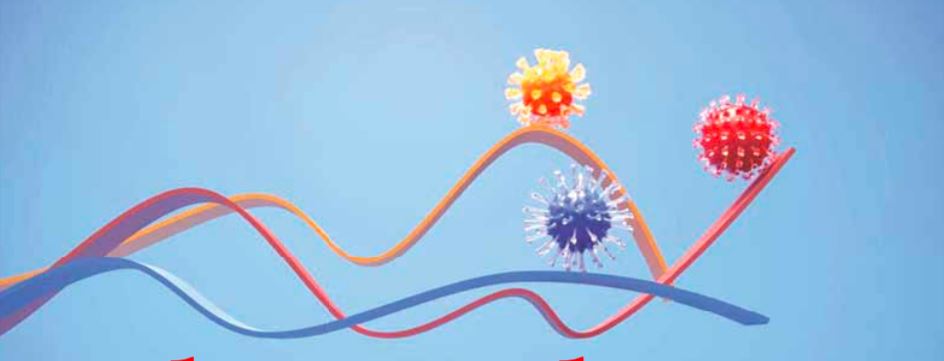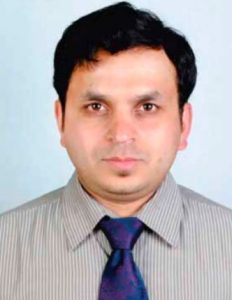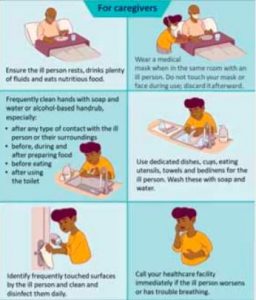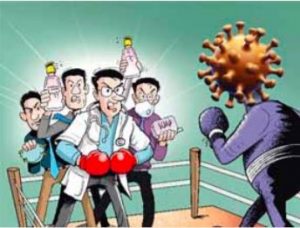

Most of us in this world are experiencing pandemic for the first time. COVID19 pandemic has been unique in the sense that it has struck worldwide simultaneously. No one in this world has been unaffected by it, either directly or indirectly. The only saving grace has been that humanity has fought back with the support of modern science. In the realm of infectious diseases, a pandemic is the worst-case scenario. When an epidemic spreads beyond a country’s borders, it then officially becomes a pandemic.
Origin of infectious infections in humans:
Communicable diseases have existed since humankind’s hunter-gatherer days. But the shift to agrarian life about 10,000 years back, created communities that made epidemics more possible.
Malaria, tuberculosis, leprosy, influenza, smallpox and others first appeared during this period. When agriculture started, domestication of animals resulted into exchange of microbes, consequently infectious diseases.
Not all the microbes exchanged between animals/birds with humans cause infectious disease, but some of them have the potential to cause epidemics or pandemics.
Pandemics that appeared in last 2000 + years:
430 B.C.: Athens- Typhoid Pandemic
165 A.D.: Antonine Plague- Smallpox
250 A.D.: Cyprian Plague
541 A.D.: Justinian Plague-Bubonic
11th Century: Leprosy
1350: The Black Death
1492: The Columbian Exchange
1665: The Great Plague of London
1817: First Cholera Pandemic
1855: The Third Plague Pandemic
1875: Fiji Measles Pandemic
1889: Russian Flu
1918: Spanish Flu
1981: HIV/AIDS
2003: SARS
2019: COVID
Present Pandemic:
Globalization- has become the main reason for rapid transmission of infections across the globe. The most significant and the first one due to globalization, was the arrival of Spanish in Caribbean.
The Columbian Exchange
Following the arrival of the Spanish in the Caribbean, diseases such as smallpox, measles and bubonic plague were passed on to the native populations by the Europeans. With no previous exposure, these diseases devastated indigenous people, with as many as 90 percent dying throughout the north and south continents. So, the concept of immunity, herd immunity and vaccination are important. Presently, mankind is facing a once in a lifetime health crisis that started from latter part of 2019 and has been lingering till date. Present level of globalization of the disease is spectacular. The disease spread across the globe in a matter of days. However, it seems the worst is over, but carelessness can bring back the phrase “winter is coming” aka “third wave”.
 Covid-19 and World:
Covid-19 and World:
The place of origin: the Wuhan city of China, was the epicenter of origin and the disease spread from December 2019.
Origin of disease: presumed as wild animal like Bat coming in contact with humans in wild life market in city of Wuhan, China
Cause of spread: Globalization and rapid local and international travel, as the disease spreads from person to person, through nose, eyes and mouth.
COVID-19 and India:
India is very crowded in urban areas. Level of hygiene practice is very low and so conducive for infectious diseases to spread. There were claims that Indians will have immunity better than other developed countries because they are accustomed to crowded places and unhygienic conditions. It was proved that immunity was not any better in Indians against Covid-19 infections.
Lockdowns:
 One of the easily available tools to prevent any infectious pandemic is Lockdown. It did help India to deal with the pandemic in a reasonably controlled manner. Entire country cooperated, even though it meant great sacrifices.
One of the easily available tools to prevent any infectious pandemic is Lockdown. It did help India to deal with the pandemic in a reasonably controlled manner. Entire country cooperated, even though it meant great sacrifices.
First wave: came with smaller peaks of cases, with lesser severity, but prolonged duration.
Second wave and Mucor mycosis: Second wave had much bigger peaks and more severe cases and superadded black fungus aka Mucor mycosis. Medical community had a very tough time and many of the Doctors died caring for the patients.
Immunization: by the start of the second wave India had access to vaccination. That I would call was a game changer. It proved that modern medicine has advanced fast and effectively.
Children: luckily children as a group had lesser severity from the disease.
Lessons learnt:
Coronavirus Pandemic has taught us several lessons and we were quick to learn.
a. Family Matters More Than We Realized
The support system most reliable was the smallest social unit that is one’s family. Older family members were taken due care from other family members. Family may be the best medicine of all. Family bonding improved during covid times.
b. We have unleashed a revolution in medicine
One of the biggest lessons we’ve learned from COVID is that the scientific community can produce amazing result collectively. In the past, it took about four to twenty years to create conventional vaccines. The new messenger RNA (mRNA) vaccines from Pfizer-BioNTech and Moderna, were developed in record-setting 11 months. The process may have changed forever, the way drugs are developed. “Breakthroughs” come after years of research. Supporting the development of the COVID-19 vaccines was more than a decade of research into mRNA vaccines, which teach human cells how to make a protein that triggers a specific immune response. Vaccines may one day treat heart disease and more. In the near future, mRNA technology could lead to better flu vaccines that could be updated quickly as flu viruses mutate with the season.
c. Self-Care Is Not Self-Indulgence
“Not only does self-care have positive outcomes for you, but it also sets an example to younger generations as something to establish and maintain for your entire life. “People took their health and lifestyle more seriously. Hospitals too came up with many preventive health packages responding to the new aspirations.
d. Have a Stash Ready for the Next Crisis
The need to augment our retirement savings system to help people put away emergency savings is crucial. Live healthfully, live long. More insights from the study:
A healthy 75-year-old was one-third as likely to die from the coronavirus as a 65-year-old with multiple chronic health issues.
The bottom line:
Age affects your risk of severe illness with COVID, but you should be far more focused on avoiding chronic health conditions. “Coronavirus also highlighted that health factors like poor diet and lack of exercise cause so much preventable illness and death.
e. Exercise remains critical.
In May 2020 a British study of 387,109 adults in their 40s through 60s found a 38 percent higher risk for severe COVID in people who avoided physical activity. Mobility should be considered one of the vital signs of health.
 f. We Befriended Technology, and There’s No Going Back
f. We Befriended Technology, and There’s No Going Back
Arguably the biggest long-term societal effect of the pandemic will be a grand flipping of the switch that makes the digital solution the first choice of many Indians for handling life’s tasks. We still may cling to a few IRL (in real life) experiences, but it is increasingly apparent that easy-to-use modern virtual tools are the new default. If nothing else, COVID has shown us how resilient and adaptable humans are as a society when forced to change.
Work Is Anywhere Now — One of the major impacts of the new working-from-home focus is that more jobs are becoming non-location-specific.
g. Loneliness Hurts Health More Than We Thought
What we’ve learned from COVID is that isolation is everyone’s problem. It doesn’tjust happen to older adults; it happens to us all.
h. Telemedicine- can be a solution?
Medical care cannot be done 100 % virtually, as physical examination by a doctor is a very important factor in diagnosing medical illness and treating.
i. What India learned from Covid-19 pandemic:
- Testing was a challenge
- Ventilators are important
- Oxygen saves lives
- No substitute for masks, hand hygiene
Vaccination could be made more accessible
Indian scientists’ triumph:
Both vaccines currently part of the national program are manufactured in India. While Covishield was developed by researchers at Oxford University, Covaxin has been developed indigenously as a collaboration between scientists of the National Institute of Virology in Pune and pharmaceutical company Bharat Biotech.
Fighting Infodemic:
 Amidst the pandemic, there is an overflow of misinformation regarding the protection and cure from COVID-19. The infodemic of misinformation creates panic and poses a serious threat to public health attempts to contain the virus. Panic buying, false cures, and spread of disinformation amplify the risk of health loss and social disorder. Many business houses spread false news that they have found a cure and made money out of people’s misery. Public needs to know where to get authentic information. Modern medicine doctors were actively involved in stopping spread of wrong information about COVID-19. WHO website is source of authentic information about COVID-19.
Amidst the pandemic, there is an overflow of misinformation regarding the protection and cure from COVID-19. The infodemic of misinformation creates panic and poses a serious threat to public health attempts to contain the virus. Panic buying, false cures, and spread of disinformation amplify the risk of health loss and social disorder. Many business houses spread false news that they have found a cure and made money out of people’s misery. Public needs to know where to get authentic information. Modern medicine doctors were actively involved in stopping spread of wrong information about COVID-19. WHO website is source of authentic information about COVID-19.
When will the Covid-19 pandemic end?
Globally and nationally, the epidemiological and public-health situation remains dynamic, and the prospects for each country group are subject to uncertainty.
Factors that could influence actual outcomes include:
Mutant variants- escaping vaccine induced immunity
Change in virulence and infectiousness
Remembering:
I had a close friend Dr. Basavaraj H K. Surgeon ESI medical college, Rajajinagar, Bangalore. We were classmates from sixth standard to 12 standard at Jawahar Navodaya Vidyalaya. We were also colleagues at ESI Medical college, Rajajinagar, Bangalore. He contracted Covid-19 in the first wave and succumbed to the same. Till date, it saddens me and is still unacceptable to me. He left behind him a young mother, child and aged parents.
Many of my colleagues have died, the death of a fellow doctor is always tragic, but to lose so many at the hands of the virus is devastating. We should remember that we should not risk our lives or health for work, and honor those that have paid this ultimate sacrifice.
“During the pandemic the dedication, bravery and compassion of all healthcare workers has shone through in the fight against the coronavirus. India will always remember them.
“We owe them our gratitude, our respect, and a pledge that we will remember them.”
Dr Praveen Ramachandra
MBBS, MD, DM (Endocrinology &
Human Metabolism), MRCP (UK)
Senior Endocrinologist
Arka Hospital, Bangalore.













